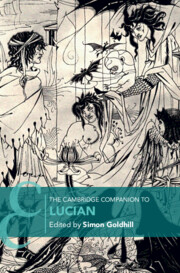Book contents
- Frontmatter
- Contents
- List of Figures and Tables
- List of Contributors
- 1 Introduction
- Part I
- Part II
- 8 In Praise of the Fly
- 9 Lucian’s Phalaris
- 10 Lucian the Doorkeeper: Inside and Outside in Lucianic Poetics
- 11 Geographical Authority and Bodily Entanglement in Lucian’s True Histories
- 12 Menippus Goes to the Moon: Fantastical Astronomy and Lucian’s Scientific Imagination
- 13 Lucian and Christianity
- 14 Identification and Distance in Lucian’s Dialogues of the Courtesans: Subjects and Their Absences
- 15 ‘Here’s Looking at You … ’: The Dialogues of the Gods and the Erotics of the Visual
- Part III
- References
- Index Locorum
- Subject Index
- Cambridge Companions to Literature
12 - Menippus Goes to the Moon: Fantastical Astronomy and Lucian’s Scientific Imagination
from Part II
Published online by Cambridge University Press: 07 November 2024
- Frontmatter
- Contents
- List of Figures and Tables
- List of Contributors
- 1 Introduction
- Part I
- Part II
- 8 In Praise of the Fly
- 9 Lucian’s Phalaris
- 10 Lucian the Doorkeeper: Inside and Outside in Lucianic Poetics
- 11 Geographical Authority and Bodily Entanglement in Lucian’s True Histories
- 12 Menippus Goes to the Moon: Fantastical Astronomy and Lucian’s Scientific Imagination
- 13 Lucian and Christianity
- 14 Identification and Distance in Lucian’s Dialogues of the Courtesans: Subjects and Their Absences
- 15 ‘Here’s Looking at You … ’: The Dialogues of the Gods and the Erotics of the Visual
- Part III
- References
- Index Locorum
- Subject Index
- Cambridge Companions to Literature
Summary
Focusing on Menippus’ description of his celestial journey and the great cosmic distances he has travelled, I argue that Icaromenippus is a playful point of reception for mathematical astronomy. Through his acerbic satire, Lucian intervenes in the traditions of cosmology and astronomy to expose how the authority of the most technical of scientific hypotheses can be every bit as precarious as the assertions of philosophy, historiography, or even fiction itself. Provocatively, he draws mathematical astronomy – the work of practitioners such as Archimedes and Aristarchus – into the realm of discourse analysis and pits the authority of science against myth. Icaromenippus therefore warrants a place alongside Plutarch’s On the Face of the Moon and the Aetna poem, other works of the imperial era that explore scientific and mythical explanations in differing ways, and Apuleius’ Apology, which examines the relationship between science and magic. More particularly, Icaromenippus reveals how astronomy could ignite the literary imagination, and how literary works can, in turn, enrich our understanding of scientific thought, inviting us to think about scientific method and communication, the scientific viewpoint, and the role of the body in the domain of perhaps the most incorporeal of the natural sciences, astronomy itself.
- Type
- Chapter
- Information
- The Cambridge Companion to Lucian , pp. 247 - 267Publisher: Cambridge University PressPrint publication year: 2024

